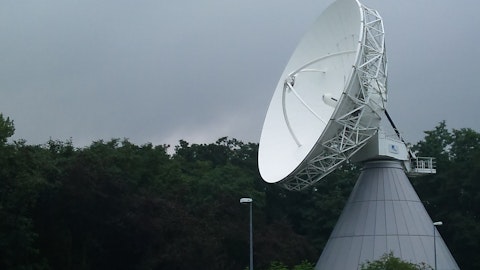Kyle Pickens: So the way that the system works, and as Jay and I tell people all the time, we’re often confused for engineers, but we actually aren’t. But the way that the system works is it effectively is allowing you to get the full capacity of all the radios that you can see in an area. And so a lot of times, as you add density, not a lot of times in other situations when you add density of radios, you’re increasing the overlapping cells. And then you’re therefore increasing the noise and capacity as a function of signal-to-noise ratio. And so effectively, what they’re saying is that with a 10 megahertz channel and multiple RRUs that you can see you’re getting all of the capacity of all the RRUs, or not all, but you’re getting that kind of linear gain and capacity as you’re adding RRUs. And that’s basically what it is.
George Sutton: That was a very geeky answer. Thank you very much.
Kyle Pickens: Thanks.
Operator: [Operator Instructions] Your next question comes from the line of [Jeffrey Goodfellow]. Your line is open.
Unidentified Analyst: Hi, Jay. Jeff Goodfellow here. I’m wondering if I could get some colorful thoughts on two areas. One is the request for comments for the petition of rulemaking by your next constellation launch provider, SpaceX who wants to share Globalstar’s spectrum, apparently, along with some other people, companies. And second. No, we’ll just go with that. Thank you,
Kyle Pickens: Jeff, you know that, there is always a process going on at the FCC. And this service that we offer today is now in the hands of millions and millions of users globally. And it provides lifesaving services daily. So we are extremely comfortable with where we are at the FCC. And there’s always going to be a little noise in the background there. But the fact is that we’ve operated for decades with their help, and we’ll continue doing what we do today with the help of the FCC. And that’s flying satellites, providing MSS services and saving lives. They know that, our partner knows that. And we’re very, very comfortable in that working relationship. So, we don’t expect any changes to the regime that we live with.
Unidentified Analyst: Great. Thank you so much.
Kyle Pickens: Thank you, Jeff.
Operator: Your next question comes from the line of Charles Morris from Greenhouse. Your line is open.
Charles Morris: Thank you. Good afternoon. Wholesale capacity services were relatively flat year-on-year. What is the — what should I infer about that as we look to growth going forward?
Rebecca Clary: Yes, thanks for the question, Charles. So we have disclosed before the first quarter ’23 included $6.5 million of out of period revenue. About half of that was non-recurring in nature. So if you adjust for that, we’re up quite a bit. But that’s where a lot of the variability that I refer to in my remarks comes into play as far as revenue.
Charles Morris: And that was on wholesale capacity services, that $6 million?
Rebecca Clary: Yes.
Charles Morris: Got it. Appreciate that. And yes. Thank you. Appreciate that. That’s it for me.
Rebecca Clary: Okay. Thanks for the question.
Operator: Your next question comes from the line of Lyman Delano from Beck Mack & Oliver. Your line is open.
Lyman Delano: Good afternoon, gentlemen. My question was related to the decline by the FCC of SpaceX’s license application for authority in your L&S band that was turned down at the end of March. So, and you, someone just addressed that a couple of minutes ago, but I was wondering if you could elaborate as to whether it is likely that SpaceX will continue to lobby and line up support for going back again to the FCC. Jay, you said you were confident about your relationship, but I just would love it if you could reiterate that. And then one small question afterwards related to either a rumor or a report that the Mexican government some months back was putting up for auction your L&S band in Mexico. And I haven’t heard anything more about that. And I wonder if you could elaborate.
Jay Monroe: Lyman, let’s take the second one first. It would probably make some sense to check in with Barbie at one point or another on that process, but the process is effectively one that we are in the middle of and will participate in. And we’re likely the only party that will do that for a number of reasons. But Barbie can give you, of course, a lot more detail on that when the time is right for you.
Lyman Delano: Okay.
Jay Monroe: On the question about people continuing to auger at the FCC for things, that’s, as I said, gone on forever. And there are things that hang around the FCC for long, long periods of time and nothing ever moves on them. So I wouldn’t be troubled about that. I would go up to 30,000ft and look down and given the services that we provide, and now to the millions of users that we provide it to, and then recognize that it’s a lifesaving service, we are very comfortable that the FCC will continue to do what it has done for Globalstar for decades, which is permit us to continue to operate our services, expand it as we have in the last years when we did our wholesale arrangement, as we’re doing now with that government services thing that we’ve talked about.
And again, they’ll just let us — give us the room that we need in order to fly satellites and save lives. I just think that’s the thrust of it. And there can always be stuff in the background, but I don’t think it’s going to dissuade the FCC from the path that they’ve been on with us for decades.
Lyman Delano: Thank you.
Jay Monroe: Thank you.
Operator: No further questions at this time. Thank you, ladies and gentlemen for participating. This concludes today’s call. You may now disconnect.
Follow Globalstar Inc. (NASDAQ:GSAT)
Follow Globalstar Inc. (NASDAQ:GSAT)
Receive real-time insider trading and news alerts



